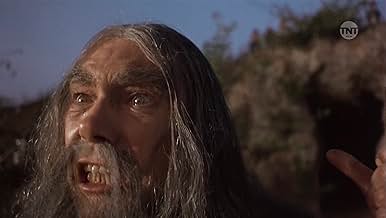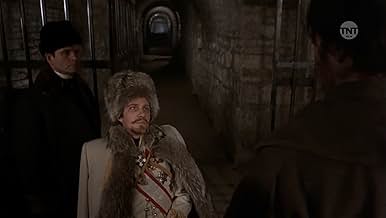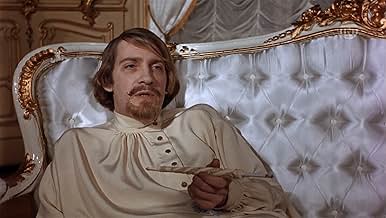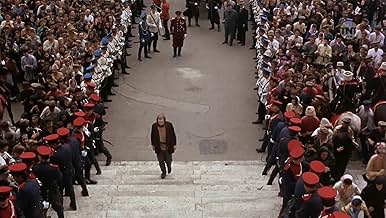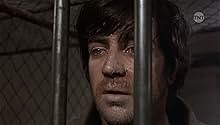ÉVALUATION IMDb
6,8/10
1,5 k
MA NOTE
Ajouter une intrigue dans votre langueIn Czarist Russia, around 1911, a Russian-Jewish handyman, Yakov Bok (Sir Alan Bates), is wrongly imprisoned for a most unlikely crime.In Czarist Russia, around 1911, a Russian-Jewish handyman, Yakov Bok (Sir Alan Bates), is wrongly imprisoned for a most unlikely crime.In Czarist Russia, around 1911, a Russian-Jewish handyman, Yakov Bok (Sir Alan Bates), is wrongly imprisoned for a most unlikely crime.
- Director
- Writers
- Stars
- Nommé pour 1 oscar
- 8 nominations au total
Avis en vedette
It is not often that cinema can do justice to a great novel. This one brings out the existential questions of the lead character Yakov Blok in an honest manner, true to the original. I think I would place the credit more with screenplaywriter Dalton Trumbo for this effort. He did not even change some of the key lines of the book. I wonder what Malamud would have thought of the script.
Frankenheimer needs praise in some sequences, the prison sequences and the seduction sequence--but what amuses me no end is why he chose to cast the three actresses who speak their lines with no care for even a semblance of being East European.
Alan Bates, Dirk Bogarde, Hugh Griffith, David Warner and Ian Holm are all good actors but Frankenheimer made no effort to make them speak like Russians or East Europeans. Bogarde is predictable in his role, but Alan Bates carried the film. He alone played his role with conviction. Maurice Jarre's music was good but not his best.
Like "Gandhi" this film will be remembered because of the subject, not because of its cinema. The true hero was not Bates, not Trumbo, not Frankenheimer--it was Malamud!
Frankenheimer needs praise in some sequences, the prison sequences and the seduction sequence--but what amuses me no end is why he chose to cast the three actresses who speak their lines with no care for even a semblance of being East European.
Alan Bates, Dirk Bogarde, Hugh Griffith, David Warner and Ian Holm are all good actors but Frankenheimer made no effort to make them speak like Russians or East Europeans. Bogarde is predictable in his role, but Alan Bates carried the film. He alone played his role with conviction. Maurice Jarre's music was good but not his best.
Like "Gandhi" this film will be remembered because of the subject, not because of its cinema. The true hero was not Bates, not Trumbo, not Frankenheimer--it was Malamud!
A great cast manages to save the film from unremarkable direction. Dalton Trumbo's script fits the long, winding tale of degradation into the confines of film quite well. Though the paranoia of the book is underplayed to the point you would miss that plot element entirely if you didn't read the book. The message of the book, that self-doubt and self-loathing cripples a person mostly cast aside in favor of a straight-forward prison tale and screed against bigotry. Luckily Trumbo preserved the line where Bok denies any sanctity in the act of mere suffering. So at least they didn't completely miss the point.
Also, the scene with the clergyman seems oddly out of character for a guy who is supposed to be confused and constantly on the verge of a mental breakdown.
Also, the scene with the clergyman seems oddly out of character for a guy who is supposed to be confused and constantly on the verge of a mental breakdown.
An interesting picture. The portrait of a friendly, non-political Jew captured and accused for ridiculous crimes he did not, and for religious reasons, could not commit. It leaves you with a feeling of anger because of the inhumanity of men towards men. Enjoy!
Alan Bates is one of the most sadly forgotten actors from the 60's and 70's. While he's been doing mostly stage work recently, many seem to have forgotten the extraordinary output that he had: Zorba the Greek, A Kind of Loving, Georgy Girl, Far From the Madding Crowd, An Unmarried Woman, Women in Love, Butley, and this.
His performance as Yakov Bok, a Jewish handyman wrongly accused of murder, is the the driving force behind Dalton Trumbo's adaption of Bernard Malamud's Pulitzer Prize-winning novel. While John Frankenheimer's direction is rather clunky at times (a disappointment, seeing as he was coming off a good run with The Manchurian Candidate, Seven Days in May, and The Train), the length is about twenty minutes too long, and a few supporting characters remain under-developed, his gritty performance keeps The Fixer going. It's interesting to see Yakov go from being a non-religious Jew who agrees to work for an Anti-Sematic official for money to a political prisoner who will proclaim his innocence despite whatever torture is inflicted on him. As the brutality of the officials grows harsher, his religious feelings grow stronger, and Bates makes it believable from beginning to end.
Dirk Bogarde also does well as a lawyer who will defend Yakov at any cost (even though his character's intentions remain unclear), as does Ian Holm as an investigator who considers Jews to be inhuman criminals.
The Fixer had a brief run on video a few years ago, but I am not sure if it is still being circulated.
His performance as Yakov Bok, a Jewish handyman wrongly accused of murder, is the the driving force behind Dalton Trumbo's adaption of Bernard Malamud's Pulitzer Prize-winning novel. While John Frankenheimer's direction is rather clunky at times (a disappointment, seeing as he was coming off a good run with The Manchurian Candidate, Seven Days in May, and The Train), the length is about twenty minutes too long, and a few supporting characters remain under-developed, his gritty performance keeps The Fixer going. It's interesting to see Yakov go from being a non-religious Jew who agrees to work for an Anti-Sematic official for money to a political prisoner who will proclaim his innocence despite whatever torture is inflicted on him. As the brutality of the officials grows harsher, his religious feelings grow stronger, and Bates makes it believable from beginning to end.
Dirk Bogarde also does well as a lawyer who will defend Yakov at any cost (even though his character's intentions remain unclear), as does Ian Holm as an investigator who considers Jews to be inhuman criminals.
The Fixer had a brief run on video a few years ago, but I am not sure if it is still being circulated.
This was Frankenheimer's second big color movie (after Grand Prix in 1966). Alan Bates was nominated for the Academy Award for his portrayal of Yakov Bok, and his performance was certainly Oscar worthy. The movie is based on Bernard Malamud's 1966 Pulitzer Prize winning novel.
---------------------------------------------------------------------
"Bernard Malamud based The Fixer on the case of Mendel Beilis, a Jewish bookkeeper for a brick factory who was accused of ritualistically murdering a Christian child. With very little evidence against him, the Russian government pushed for the conviction of Beilis in order to justify anti-Semitic policies that were being enacted at the time. The novel's protagonist, Yakov Bok, also works in a brick factory, and he is charged, for no particular reason except being Jewish, for a crime just like the one with which Beilis was charged. As in Malamud's fictionalized version, the actual case occurred between 1911 and 1913 in the Ukrainian capital, Kiev. The Beilis case is credited with being one of the main contributing factors in bringing about the Russian Revolution by raising the sense of distrust Russian citizens felt toward their government and the anger of people around the world. The political situation surrounding the case is hardly touched upon in The Fixer. Most of the book focuses on Yakov's life in solitary confinement, waiting for years in prison for the murder charge to be formally levied against him so that he can get on with the trial.
The Fixer was published in 1966, more than fifty years after the Beilis case had been settled in court, but Malamud could count on his audience to be familiar with the circumstances of what had happened because the case was and is an important event in the history of the Jewish struggle for peace and security. The book won the National Book Award and the Pulitzer Prize, and is considered one of the finest in the canon of books by one of America's finest authors." – Quoted from encyclopedia.com
--------------------------------------------------
The movie follows the odyssey of Yakov Bok (Alan Bates)—'a fixer' or handyman--as he leaves his small pre-Revolutionary Ukrainian town to travel to the city of Kiev. Although he has no strong religious or political feelings and never had thought that he could only be defined by one word--'Jew'--he lives in the ghetto. When a tailor in the ghetto suggests that he could make more money by passing as a Christian in the city, he tries. After saving a Christian, Lebedev (Hugh Griffith), in the street, he is taken in to Levedev's house and given work. Lebedev's crippled daughter, Zinaida (Elizabeth Hartman), seduces him and he willingly follows her. But, when he finds that she is 'unclean (having her period), he turns her down and leaves.
But, events change his life when he is accused of killing a young Christian boy in a 'Jewish ritual murder. Once imprisoned, almost everyone inside and outside of the prison hates him. Even though he is befriended by a defender, Bibikov (Dirk Bogarde), he is relentlessly tortured and badgered by his prosecutor, Grubeshov (Ian Holm).
During Bok's imprisonment, the case against him is built on a series of unproven accusations. The murdered boy's mother testifies that she witnessed Bok killing her son. Zinaida testifies against him (based on her previous embarrassment of having seduced him and then been turned down). However, as a Jew, he is never given the benefit of a public trial. His crime rests on the fact that he IS a Jew; that he reads Spinoza; and that he demands—and is refused--a trial for simple human decency. As his imprisonment and torture is extended he continues to grow more determined. When all attempts fail to get him to confess to the murder, a representative of the Czar offers him a pardon. But, he refuses the pardon since he has committed no crime. His determination to fight for a public trail continues until the very end.
Although this film is very good, it doesn't hold up as well as Frankenheimer's black and white movies from the 1960s. As the saying goes, 'the book is better than the movie,' Still, Bates acting is laudable and should be seen if possible.
---------------------------------------------------------------------
"Bernard Malamud based The Fixer on the case of Mendel Beilis, a Jewish bookkeeper for a brick factory who was accused of ritualistically murdering a Christian child. With very little evidence against him, the Russian government pushed for the conviction of Beilis in order to justify anti-Semitic policies that were being enacted at the time. The novel's protagonist, Yakov Bok, also works in a brick factory, and he is charged, for no particular reason except being Jewish, for a crime just like the one with which Beilis was charged. As in Malamud's fictionalized version, the actual case occurred between 1911 and 1913 in the Ukrainian capital, Kiev. The Beilis case is credited with being one of the main contributing factors in bringing about the Russian Revolution by raising the sense of distrust Russian citizens felt toward their government and the anger of people around the world. The political situation surrounding the case is hardly touched upon in The Fixer. Most of the book focuses on Yakov's life in solitary confinement, waiting for years in prison for the murder charge to be formally levied against him so that he can get on with the trial.
The Fixer was published in 1966, more than fifty years after the Beilis case had been settled in court, but Malamud could count on his audience to be familiar with the circumstances of what had happened because the case was and is an important event in the history of the Jewish struggle for peace and security. The book won the National Book Award and the Pulitzer Prize, and is considered one of the finest in the canon of books by one of America's finest authors." – Quoted from encyclopedia.com
--------------------------------------------------
The movie follows the odyssey of Yakov Bok (Alan Bates)—'a fixer' or handyman--as he leaves his small pre-Revolutionary Ukrainian town to travel to the city of Kiev. Although he has no strong religious or political feelings and never had thought that he could only be defined by one word--'Jew'--he lives in the ghetto. When a tailor in the ghetto suggests that he could make more money by passing as a Christian in the city, he tries. After saving a Christian, Lebedev (Hugh Griffith), in the street, he is taken in to Levedev's house and given work. Lebedev's crippled daughter, Zinaida (Elizabeth Hartman), seduces him and he willingly follows her. But, when he finds that she is 'unclean (having her period), he turns her down and leaves.
But, events change his life when he is accused of killing a young Christian boy in a 'Jewish ritual murder. Once imprisoned, almost everyone inside and outside of the prison hates him. Even though he is befriended by a defender, Bibikov (Dirk Bogarde), he is relentlessly tortured and badgered by his prosecutor, Grubeshov (Ian Holm).
During Bok's imprisonment, the case against him is built on a series of unproven accusations. The murdered boy's mother testifies that she witnessed Bok killing her son. Zinaida testifies against him (based on her previous embarrassment of having seduced him and then been turned down). However, as a Jew, he is never given the benefit of a public trial. His crime rests on the fact that he IS a Jew; that he reads Spinoza; and that he demands—and is refused--a trial for simple human decency. As his imprisonment and torture is extended he continues to grow more determined. When all attempts fail to get him to confess to the murder, a representative of the Czar offers him a pardon. But, he refuses the pardon since he has committed no crime. His determination to fight for a public trail continues until the very end.
Although this film is very good, it doesn't hold up as well as Frankenheimer's black and white movies from the 1960s. As the saying goes, 'the book is better than the movie,' Still, Bates acting is laudable and should be seen if possible.
Le saviez-vous
- AnecdotesThis movie was made in Hungary, then a Communist country. The cast and crew were obliged to work six days a week under considerable pressure, and director John Frankenheimer was very unpopular. Sir Dirk Bogarde always referred to him thereafter as "Frankenstein", while Sir Ian Holm reported in his memoirs nearly forty years later, that Frankenheimer had, during filming, a very obvious extra-marital affair with the daughter of screenwriter Dalton Trumbo, even though his wife, Evans Evans, was in attendance.
- ConnexionsFeatured in Hollywoodism: Jews, Movies and the American Dream (1998)
Meilleurs choix
Connectez-vous pour évaluer et surveiller les recommandations personnalisées
- How long is The Fixer?Propulsé par Alexa
Détails
- Durée2 heures 12 minutes
- Mixage
- Rapport de forme
- 1.85 : 1
Contribuer à cette page
Suggérer une modification ou ajouter du contenu manquant

Lacune principale
By what name was L'homme de Kiev (1968) officially released in India in English?
Répondre
